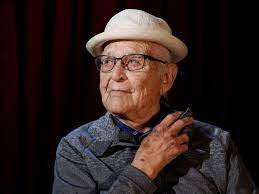The early 1970s saw the groundbreaking, wildly popular comedies “All in the Family” and “Sanford, Jr. and Son,” written, produced, and developed by Norman Lear, who revolutionized American humor. Lear passed away in 1976. away on Tuesday. His age was 101.
Variety was informed by Lear’s representative that he passed away naturally at home in Los Angeles. There will be an individual ceremony for the immediate family in the following days.
The statement sent by Lear’s family said, “We are grateful for the meaningful conveying of love and support in memories of our beautiful husband, father, and grandfathers.” “Norman possessed an imaginative, resilient, and empathic existence. His own life was devoted to maintaining the fundamental principles of our country—equality and justice for all—because he had a deep love for it. Discovering and falling in love with him has been the greatest gift of all. We are each mourning privately while yet honoring this remarkable human being. We kindly beg for your understanding.
Lear came up with the idea creating a new sitcom based on a popular British show about a feuding Queens families and an extremist, openly racist working-class man. had already established himself as a prominent comedy screenwriter and received an endorsement for an Oscar for his script “Divorce American influences Style.” “Everything in the Family” gained immediate notoriety and seemed to be liked by people of all political persuasions.
By adding sharp twists to the traditional domestic comedy formula, Lear’s programs were the first to tackle the major political, cultural, and social hotspots of the day, such as racism, abortion, homosexuality, and the Vietnam War. Nothing was off-limits; two 1977 chapters of “All in the Family” focused on the alleged rape of Edith, the wife of star character Archie Bunker.
Because of their newfound outrageousness, they became enormous box office triumphs. “Family” and “Sanford,” which are about a Black family in Los Angeles, briefly held the top two spots in the nation. Six spin-offs were produced from “All in the Family” alone. Lear also received a 1977 Peabody Medal for “giving us laughter with a social conscience,” and “Family” won four Emmys in 1971–1973. 2016 saw him receive a second Peabody for his contributions in the industry.
Lear has experimented with TV norms in several of his other works. The protagonist of “One Day at a Time” (1975–84) was a single mother of two young daughters, which was a novel idea for a sitcom. Similar to this, “Diff’rent Strokes” (1978–1986) chronicled the ups and downs of two Black children raised by a prosperous white businessman.
Lear also made other shows that were meta before the phrase was ever used. “Mary Hartman, Mary Hartman” (1976–1977) was a popular, bizarre addition to syndication that mocked the twisted drama of morning soap operas, despite not being picked up by a network. “Fernwood 2 Night,” a mock chat show based in a tiny Ohio town, was one of “Hartman’s” quirky spinoffs. Later, the program was redesigned as “America 2-Night,” moving its location to Los Angeles.
Lear argued time and time again that maintaining the viewer’s laughter was essential to his comedies.

In an interview with Onion A.V. Club in 2005, he stated, “At first, we went looking for belly laughs with all the shows.” We realized early on that the more an audience cared—we were working with, on average, 240 live people—the more they laughed if you could get them to care.
The screenplays for “Come Blow Your Horn” (1963), “The Night They Raided Minsky’s” (1968), and “The Thief Who Came to Dinner” (1971) were among the big-screen credits for Lear. In 1986, he helped finance “Stand by Me,” which was directed by Rob Reiner, a former co-star on “All in the Family.” He also executive produced “Fried Green Tomatoes” and “The Princess Bride,” which Reiner directed. In 1971, he produced and wrote “Cold therapy Turkey,” a satirical comedy intended against the tobacco industry.
In the 1980s, Lear and partner Jerry Perenchio purchased Avco Embassy Pictures; they later sold the company to Columbia Film Corporation for $250 million. With the 1999 acquisition of Concord Music Group, one of the biggest independent label operations globally, which included the catalogs of independent labels like Concord Jazz, Fantasy, Stax, Riverside, Additionally former Embassy executive Hal Gaba, he became well-known in the music industry with Milestone, Rounder, and Vanguard.
Citizens for the American Way was founded in 1981 by progressive philanthropist and Hollywood liberal Lear in response to the efforts of the reactionary Moral Majority.
Lear received several accolades from the Writers Guild of America, a lifetime achievement award from the Producers Guild of America, and the National Medal of Arts in 1999. In 2017, he was recognized at the Kennedy Center Honors. Induction into the Television Academy’s Hall of Achievement also occurs for Lear. Regarding the later accolade, Lear expressed his disapproval of President Donald Trump’s actions by threatening to skip a celebration. Lear told Variety that he was “happy not to go to the White House” after Trump finally decided not to attend the function.
Lear had been born in the Connecticut city of New Haven on July 27, 1922. He said in interviews that his parents, who were Jews of Russian descent, were the inspiration for Archie and Edith Bunker. In 1942, he left Boston’s Emerson College to join the American Air Force, where he flew 52 missions as a radio operator and gunner on B-17 bombers in the European theater.
Lear relocated to Los Angeles to establish himself as a press agent following the war. However, he transitioned into comedic writing after teaming up with his cousin Ed Simmons’s spouse. The two wrote for the comedians Dean Martin and Jerry Lewis, the largest comedy duo in the country at the time, when they starred on “The Hamilton Comedy Hour” in 1952–1953. This was their big break. Together with Bud Yorkin, he became well-known as a scribe for variety shows hosted by Martha Raye, Chattanooga Ernie Ford, Celeste Holm, and George Gobel.
Lear had a reputation in the 1960s for writing and co-producing specials with Yorkin, his Tandem Productions partner, that starred Bobby Darin, Danny Kaye, Andy Williams, and Henry Fonda (who starred in Lear’s Western series “The Deputy”).
Even though Lear had sporadic credits on theatrical pictures in the late 1960s, Tandem’s creation of “All in the Family,” which drew inspiration from the similarly scathing and enduring British series “Until Death Do Us Part,” catapulted him to the top of the TV producer ranks. The program was initially taken up by ABC, but as the network felt uneasy about its content, it was rejected. CBS then picked up the show, making it the first comedy in the United States to be recorded live.
The dynamic new series took off thanks to the amazing chemistry between its four leading ladies: Rob Reiner as Gloria’s hippie husband Michael “Meathead” Stivic; Carroll O’Connor as his bigoted, conservative, foul-mouthed Archie; Jean Stapleton as his woozy, loving wife Edith; and Sally Struthers as their tough-minded daughter Gloria. Over the course of its existence, the show garnered 22 Emmys; O’Connor won four, Stapleton won three, Reiner won two, and Struthers won one. (A 2019 Emmy was won by an ABC special on the show and its offshoot “The Jeffersons,” which Lear executive produced.)
The program turned into a cottage industry, spawning several spin-offs: “Maude,” starring Bea Arthur as Edith’s brash, acid-tongued cousin (rumoredly based on Lear’s second wife Frances); “The Jeffersons,” starring Sherman Hemsley and Isabel Sanford as the African American neighbors who lived next door to the Bunkers; “Gloria,” in which Struthers returned to the role after the character’s divorce; “Checking In,” starring Marla Gibbs as the maid for the Jeffersons; and, in the 1990s, “704 Hauser,” a poorly received program set in the Bunkers’ old home. “Archie Bunker’s Place,” a quasi-spinoff that took place in the Queens bar owned by the title character, aired from 1979 to 1983.
Based on the British TV series “Steptoe and Son,” which he had turned into a TV film in 1965, Bud Yorkin played the lead role in another Tandem production. In “Sanford and Son,” renowned Black comedian Redd Foxx played the irascible and explosive L.A. junkman Fred Sanford, opposite his long-suffering son Lamont (Demond Wilson). After Foxx’s sardonic portrayal of intolerance akin to that of Bunker, the show’s run lasted a robust six seasons.

Following the dissolution of the Tandem collaboration in 1975, Lear went on to create “Mary Hartman, Mary Hartman,” another avant-garde undertaking. It was conceived as a daily program with an ongoing storyline, similar to daytime network soap operas. The eponymous character, played by Louise Lasser, was the focal point of Fernwood’s darkly comedic small-town plays. After airing for more than 400 episodes, “Hartman” and its follow-up “Forever Fernwood” gave rise to the impersonation talk show “Fernwood 2 Night,” which starred Martin Mull, a veteran of “Hartman,” as host Barth Gimble and Fred Willard, his sidekick Jerry Hubbard.
Even if “All in the Family” and its offspring brought a cutting political edge and previously unheard candor to television, Lear subsequently took a detached look at what the program had accomplished in the end.
“I didn’t see it changing television at all,” he declared. For several millennia, we were surrounded by a Judeo-Christian morality that did little to eradicate bigotry. For that reason, I think it’s ridiculous that the little half-hour comic could have an impact.
The sitcoms “Sunday Dinner” and “704 Hauser,” Lear’s final two productions, both had short runs in the early 1990s. Although he was not involved in its production, he was named an executive producer for the 2017–2020 revival of “One Day at a Time,” which was centered around a Latino family and took place in Echo Park, Los Angeles.
The films “Way Past Cool” (2000) and “El Superstar: The Unlikely Rise of Juan Frances” (2008) were among Lear’s latter efforts. One of his documentaries, “Pete Seeger: The Power of Song,” was released in 2007.
The 2016 documentary “Norman Lear: Just Another Version of You” examined his lengthy career. He wrote a book and presented the podcast “All of the Above With Norman Lear” in his senior years. 2014’s “Even This I Get to Experience” The documentary “Rita Moreno: Just A Girl Who Decided to Go For It” had him as executive producer as well.
In addition to his work with the nonprofit organization People for the American Way, which kept an eye on right-wing organizations’ activities, First Amendment issues, and judicial appointments, Lear established Declare Yourself, a nonpartisan non-profit, in 2004 to promote voting among young people.
His three wives, Lyn Davis, and his six children and four grandkids survive him.




